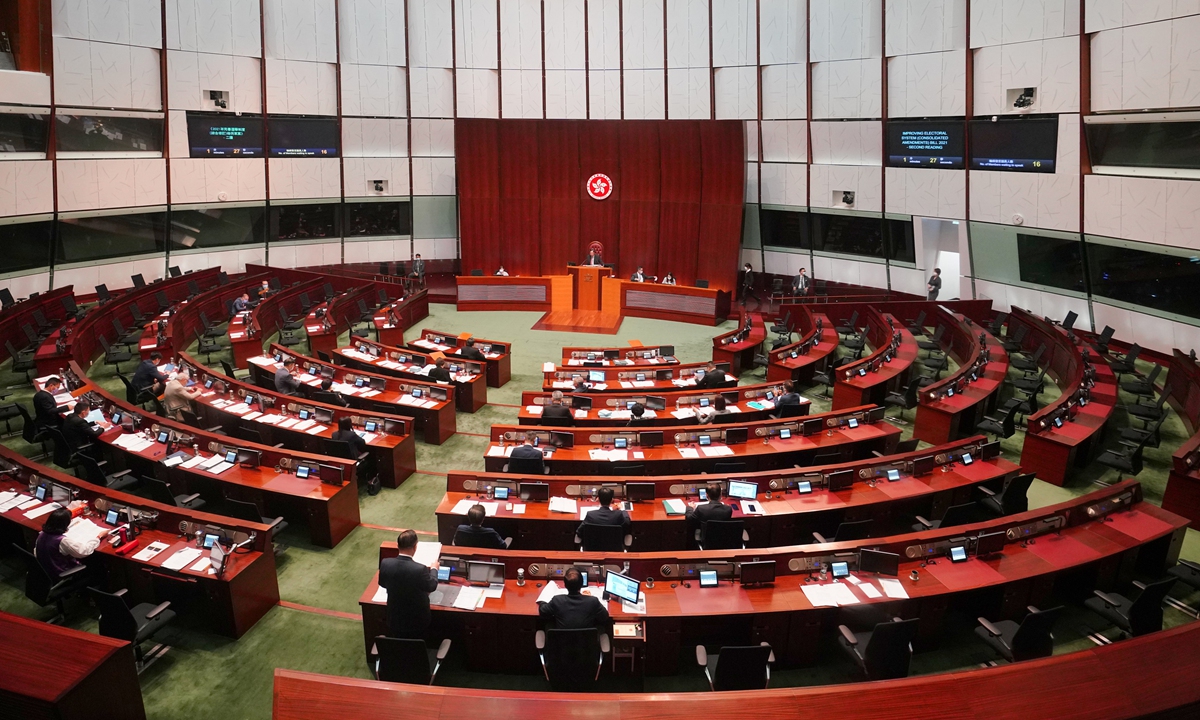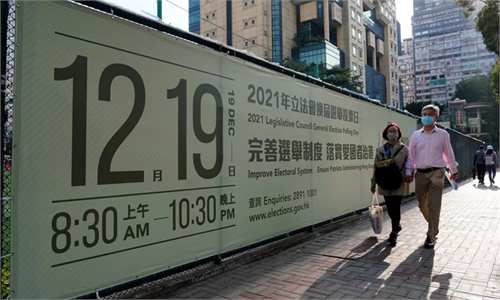Exclusive: Candidate from opposition camp refutes West’s smear of LegCo election as ‘selection’
As some Western media outlets, along with secessionists like Nathan Law Kwun Chung and Ted Hui Chi-fung, questioned the legitimacy of the Hong Kong Legislative Council (LegCo) elections by hyping the absence of pan-democratic candidates, Tik Chi-yuen, former vice chairman and founding member of the Hong Kong Democratic Party, told the Global Times in an exclusive interview that as a candidate from the opposition camp who had been nominated and supported by pro-establishment figures, his participation in the election fully shows that the central government is expecting a diverse LegCo with broad representation.
Although many Hong Kong residents applauded the LegCo election, the first since the electoral reform took effect, some radical opposition figures promoted an online campaign titled "release my candidates." The campaign comes as some former lawmakers were charged with conspiring to subvert state power and were jailed earlier this year.
"Pan-democratic figures should realize that by continuing confrontation and challenging the central government's redlines, there's no way out," Tik told the Global Times. Among 153 candidates who are competing for 90 seats for the LegCo, 13 are believed not to be pro-establishment figures, and Tik is one of them. He is running for election under the social welfare functional constituency.
Talking about the process of being nominated, Tik noted that at the beginning, some members of the Election Committee hesitated to let him run due to his position which is not pro-establishment. However, when the central government released a much clearer directory calling for a LegCo with more diverse voices, the process was made much easier.
Unlike Tik, a number of pan-democratic candidates chose to be absent in this LegCo election. For example, the current chairman of the Democratic Party, which claims to be moderate, Lo Kin-hei, asked party members not to participate in the election or propose any suggestions for serving Hong Kong. Also, some anti-China rioters instigated others not to vote or cast blank votes.
There are two major reasons why candidates who are not pro-establishment have lower participation rates. Some traditional pan-democratic candidates consider the new electoral system as "unfair" or they say "democracy took a step backward," and others are afraid that participating in the election would be interpreted as "changing their stance," thereby scaring away their supporters.
"It's a pity that the current chairman of the Democratic Party and other pan-democratic groups made that choice of not taking part in the election," Tik said, noting that he tells them if they give up this chance, it only affects the future of those parties in Hong Kong.
"I hope that those pan-democratic figures can understand that it's a progressive procedure to reach democratic goals, politics is about compromise," he said.

Legislative Council of Hong Kong (LegCo) Photo: VCG
When we look back, LegCo used to be a place to wage battles no matter what the circumstances were. Whether the bill was good or bad, opposition lawmakers fought against it only because they had a different political stance or ideological leaning, the former lawmaker noted.
"Turning LegCo into a place for political battles over the past year served no good for the HKSAR government, political groups, Hong Kong citizens and social development," Tik said, noting that it should be a place for problem solving, not troublemaking.
For example, on the social warfare front, there's no huge difference in ideas between pro-establishment members and those that are not. They can work together and have a full discussion with the HKSAR government to improve the social warfare, Tik said, noting that the HKSAR government should also hold an open attitude to communicate with different political groups.
Like Tik, some former LegCo lawmakers believe that without the sabotage of radical lawmakers or secessionists at the council, lawmakers can focus on the issues in the future by working with the HKSAR government to solve problems in the city with support from the central government.
"I think we'll see a much smoother road ahead in the next two or three years, either in economic development or political reform," he said.
Regarding the role that pan-democratic groups could play in the city's future political and social issues after the national security law for Hong Kong and electoral reform took effect, Tik believes that the central government expects that different political parties can play their role under the Basic Law, and encouraged pan-democratic candidates to take part in elections.
"I think the central government hopes to see Hong Kong as a diverse place with different positions and interests. Pan-democratic groups still have very large room in the future. What matters is that they need better communication with the central government and the HKSAR government instead of engaging in violent confrontation like they used to in the past few years," he said.
Also, there is a redline of the central government that must not be crossed, Tik continued. "To challenge the central government's power of governing does no good to any party. Especially as an international city, Hong Kong's political issues should be handled by ourselves within the country," he said, noting that relying on external forces and making things complicated would only raise concerns from the central government.


